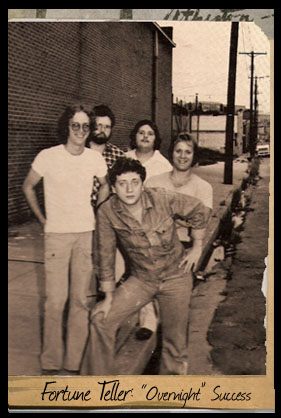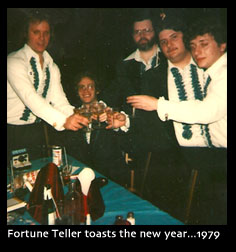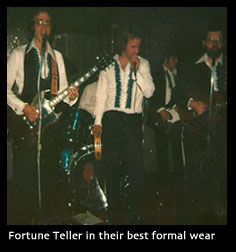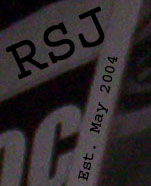 You always hear about "overnight success" for a band when their song hits the radio, becomes popular, and suddenly
the band is everywhere. But that didn't actually happen overnight -- all performers have their experience with the down and
out long haul of working. Long before you heard that song, those guys practiced and played in someone's garage and as they
gained some notability, received their first booking in a bar or club. Then, somewhere along the grind, someone with connections
heard them and gave them a great opportunity. Eventually you heard their song, bought the album and went to see them on that
super huge summer tour. "Overnight" takes much longer for some than others. Anyone in the music industry knows
that there's no such thing as "overnight success," but Fortune Teller has quite the combination of both the idea
and the reality.
Guitarist Danny Amburn went to bed one night after yet another nothing special gig and woke up to the news that the Fortune
Teller album he recorded with the band years ago had achieved "monumental" status. Danny was gigging with a working
band when he contacted a friend to photograph and video the band playing an event. The very next morning he received a call
when the photographer stumbled upon a photo of the cover of the "Inner City Scream" LP in a Google image search.
When he checked out the page hosting the image, it was a pretty big shock to find fantastic reviews and a lot of praise for
the album. As it turns out, after more than 30 years, the independent private press album had developed quite a following,
and the original vinyl was in high demand. Seeing this, he promptly called the guys up to tell them the unexpected news...
Rock Star Journalism: Tell us about the origins of the band. How did you finalize your lineup?
John: (Joe and I) were playing a show and Ed M. was playing lead on "Brown Sugar" and (Danny) walked onstage
and started playing the rip like it was supposed to be, like Keith. And I thought man I gotta play with this guy. And somehow
I kept talking to get him to play with us.
Joe: I met Bob Wells and listened to some of his music and said, "You want to join a band with us?"
Danny: John brought Mark in.
John: He worked with me, that's how I met him. Mark couldn't speak any English; he was Russian.
RSJ: Did you have a collaborative music process? What did each member offer?
John: Actually, there was only one that we collaborated on, and that was the "Inner City Scream;" the rest Bob
and Danny wrote. Danny honored me with letting me sing a couple of his writings.
RSJ: The song Inner City Scream was originally written in Russian, correct?
John: Yes.
RSJ: And who translated it?
John: Me and Mark did it at work.
RSJ: How long was the band together, and what caused the breakup?
Joe: Fortune Teller was together about four years. We were together before we brought Bob in and recorded, but it was
about four years; it was hard to make it, you know.
John: People would hire a disco man back then for a hundred bucks and pay us $200 for a whole band.
Joe: When we come out with this album, you didn't hear rock and roll on the radio. It was all disco. And we was fighting;
it was like an uphill battle for a rock and roll band. I mean look at that 1,2,3, Club we played, when John and the big (disco)
guy was struggling over the microphone, and our keyboard player kept saying "John. Let him have the mic; I'll buy you
a new one."
 John: I looked up and said, "You might be able to whip my ass, but I guarantee you'll be a little bit blacker and bluer
than you are now if you take that mic." He gave the mic back to me and got off the stage. Of course then all the (rock)
guys started screaming for rock and roll and it was a big riot, but they started having rock and roll there.
Joe: Mark went to the bar to get something and he come rushing back over and he said, "We got to get out of here,
we got to freakin' get out of here!" I said, "Why?" And he says, "They put our album in the oven!"
We had our album on display because we were selling them, and they put it in the pizza oven. They put sauce over it and cheese!
I went over and asked where is our album, and the lady said, "Wanna slice?" I thought, "God, we do gotta
get out of here, we're gonna get killed."
Danny: We had 2 nights there and the second night the place was full of (rock) guys.
Joe: It was cool.
John: They were thankful to us to have the bravery to come and take away the disco.
RSJ: When was the "Inner City Scream" LP recorded and released?
Joe: It was recorded at RMT studios on Eastern Avenue (in Baltimore), and it was probably released about 2 months after
that.
John: When was it released Dan?
Danny: '78.
RSJ: Would you like to clear up the internet mystery of why the album has "1968" as its date?
Danny: Actually Bob's songs were copyrighted then. Most of the stuff he did was 10 years old when he brought them in.
RSJ: Tell us about the recording process?
Danny: That's how the band sounded live. We had to take the 12 hours of studio time at the most. They set up as many
mics as they had, which was what, four? We didn't have crash cymbals, and the band pretty much just played live. A 4-track
recorder down to two tracks. Nothing on it except equalization, and some of the passages you can hear the top end equalizer
being moved, and it gives the guitar sound a little bit of a phase shifting sound, but that was just Bob moving the equalizer.
And then Bob spent two weeks mixing it.
RSJ: Why was the album dedicated to the #1 roadie Jimmy Lam?
Joe: Jimmy Lam was a really good guy for us. He did anything you would ask him to do. He would move your equipment,
if you couldn't afford to pay him, he didn't care as long as he was part of the band.
John: He did it for free.
Danny: Yeah, Joe would say he's "the best roadie promised could buy."
Joe: Right! And he drown on the Eastern Shore. He was out fishing and fell off the boat; it was sad.
John: He had just got married two nights before.
Joe: And we remembered him, and dedicated it to him.
RSJ: What do you think makes "Inner City Scream" sound so unlike all the other albums of the genre and time?
Joe: I think it was originality. You listen to the song "Inner City Scream;" there's nothing that's ever been
like that song. We're saying "get high" right? We didn't mean get high/take drugs; we meant get high with us, get
high on music, cause that's what we were into.
Danny: I think because it was written with the European sensibilities that Mark brought.
 John: Danny's right, it did have a European twist to it, and back then, you have to remember we didn't have the what the kids
have today, the electronic toys... the only way out of the city was rock and roll. You still had semi-Vietnam era going on,
and Cambodia was big time, so we were going through what the people of the '60s were going through, and we were fighting disco.
The only way we could get out of the city was idolizing or emulating in some respect the people we love -- The Rolling Stones,
Led Zepplin, and we all liked Mick and the boys.
Joe: We would travel all over for $125 because we wanted to make money, but we wanted to put our songs out there, and
get out of the inner city.
RSJ: If you could re-record the album what would you change?
Joe: I would change the recording studio. It was basically playing live, and I would clean it up. I like the storage
of the noise, but me and the drummer were on the same track; you couldn't separate us.
John: I would clean it up. We have that possibility now, to have the proper equipment to give it the sound that we want,
and that is the European sound or garage sound or what do you call it?
Joe: The Pigtown Sound!
John: Yeah! The Pigtown Sound!
RSJ: The circulation of the album is way higher than the original 500 pressing. How do you feel about having a worldwide
audience and radio airplay?
Joe: I'm thrilled about it really.
Danny: I'm glad that people liked it. We want to thank Patrick Lundbourg in Sweden for generating interest in the album
with his reviews. And Allison Wisk, she referred to the album as "monumental."
Joe: It's like a dream come true to have people have interest in this after all these years. I gave up on this album
years ago, fighting against disco and now there's people who's interested in it. It's like you add new life into us.
John: Thank you all. It has brought a charge back into me.
RSJ: What have you worked on since Fortune Teller?
John: I played rock and roll for 6 years and that was a house band. I played a little bit of country music. I went to
West Virginia thinking I could make it in country music. All we did was play local pubs and small time country. Just making
money.
Joe: And then we had Outlaw Guns.
John: Yeah, Joe and I got together with Outlaw Guns.
Joe: I went with a country band for a while, a little greasy pit we played (laughs).
Danny: I went off into being hired by whoever would have me, playing bars, plus doing my own stuff. I played with a working
country band for about 20 years.
John: So we all had to dive into country music before we could come back up and look for rock and roll?
Danny: Yeah we were all stuck in a steaming pile of country music for a long time (all laugh).
RSJ: What now?
Danny: We are currently in the process of getting it back together. (Looking for a re-issue) to get (our music) out there.
To drum up enough interest to get out and play and present it live. We are writing new tunes and looking to be ready with
an all new show of straight up rock and roll. Hopefully people will like it.
John: You know it's about time to come around. Back in the '60s when the psychedelic music was out, it was wars and rumors
of wars. What is it right now? Wars and rumors of wars. We're coming back and bringing back the European psychedelic sound
with a rock and roll twist.
Got something to say about this feature? Post it on RSJ's blog, Blendetta.com!
|

